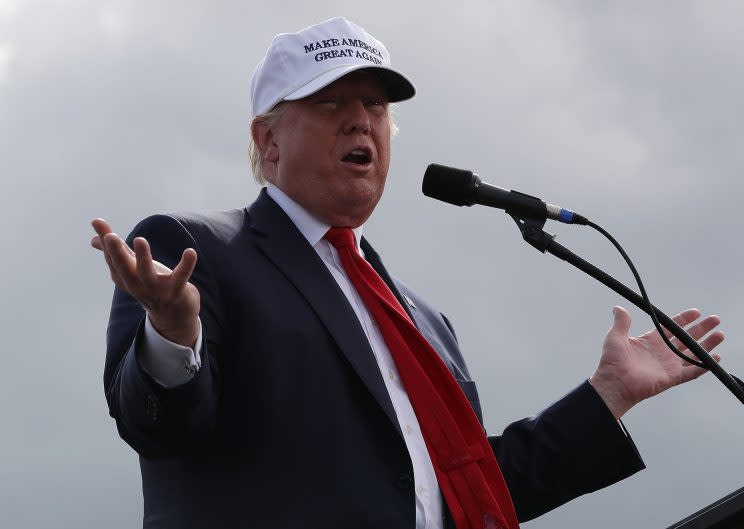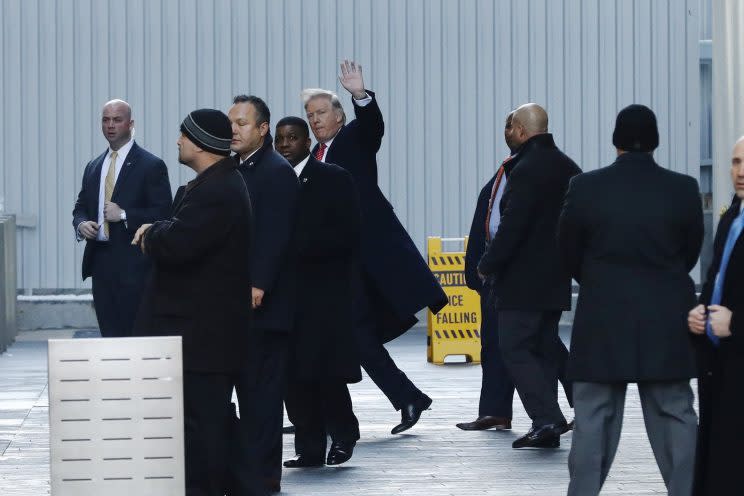Trump talked about WikiLeaks incessantly during last month of campaign, analysis finds

President-elect Donald Trump said that emails obtained through Russian hacks of the Democratic National Committee and Hillary Clinton campaign and published by WikiLeaks had “absolutely no effect on the outcome of the U.S. election.”
But during the month leading up to the Nov. 8 presidential election, Trump talked about WikiLeaks and those emails at least 164 times, according to an analysis by ThinkProgress, the Washington-based progressive think tank and news organization.
“Trump spoke about the WikiLeaks emails at least 164 times from Oct. 10 to Election Day, saying the word ‘WikiLeaks’ 124 times,” ThinkProgress noted. “That means, on average, Trump discussed WikiLeaks more than five times per day.”
During a three-day span in October, for example, Trump professed his “love” for WikiLeaks at his rallies, marveling at his ability to broadcast the leaked material and directing his supporters to read it on the whistleblower website for themselves.
“One of the big advantages of me having a rather large microphone,” Trump said at a rally in Ocala, Fla., on Oct. 12, “meaning a lot of people are listening, is that I can talk about WikiLeaks, and we are live. It’s amazing. Boom, boom, boom.”
“I’ll tell you, this WikiLeaks stuff is unbelievable,” he said a few hours later at a rally in nearby Lakeland. “It tells you the inner heart – you gotta read it.”
Since his victory over Clinton, Trump has repeatedly questioned the assessment by U.S. intelligence officials that Russia was behind the leaks, which the CIA concluded were directed by Russian President Vladimir Putin to steer the election in Trump’s favor.

On Friday, after being briefed by intelligence agencies on the cyberattacks against the United States, Trump released a statement denying that the hacks had influenced the election — and suggesting that the DNC did not have the kinds of “strong hacking defenses” employed by its Republican counterpart.
“While Russia, China, other countries, outside groups and people are consistently trying to break through the cyber infrastructure of our governmental institutions, businesses and organizations including the Democrat National Committee, there was absolutely no effect on the outcome of the election including the fact that there was no tampering whatsoever with voting machines. There were attempts to hack the Republican National Committee, but the RNC had strong hacking defenses and the hackers were unsuccessful,” his statement read.
Related: Trump suggests he sides with Assange over CIA on Russian hacking
Trump did not say, however, whether he thought Russia was behind the hacks. On Sunday, Reince Priebus, Trump’s incoming chief of staff, said the president-elect now agrees with the assessment that Russia engaged in cyberattacks aimed at disrupting the presidential election and that “actions may be taken.”
But some former intelligence officials fear Trump’s public questioning of their conclusions has already done damage.
In an op-ed published Saturday by the New York Times, Michael Morell, former acting director of the CIA, said he expects a “wave of resignations” in the wake of Trump’s “crusade” against the intelligence community.
In particular, Morell said, Trump’s suggestion that the CIA “manufactured its Russia analysis to undercut him” — effectively accusing the agency’s officers of being “dishonorable” — was “a gut punch.”




